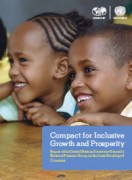UN Secretary-General Ban Ki-moon appointed the Eminent Persons Group, which began its work in October 2010, to recommend "a new generation of policy measures" in aid, trade, foreign direct investment, technology transfer, debt relief and adaptation to and mitigation of climate change.
The resulting report says that the specific challenges faced by mall island developing States (SIDS), such as their particular vulnerability to climate change, must be addressed in any new Programme of Action on LDCs.
 29 March 2011: The UN Secretary-General’s Eminent Persons Group on the Least Developed Countries (LDCs) has released its report, titled “Compact for Inclusive Growth and Prosperity.” The report finds that the structural limitations of LDCs must be addressed in order to close the gap between LDCs and the rest of the world, and outlines objectives and targets for a new Programme of Action (PoA), including on small island developing States (SIDS) and climate change.
29 March 2011: The UN Secretary-General’s Eminent Persons Group on the Least Developed Countries (LDCs) has released its report, titled “Compact for Inclusive Growth and Prosperity.” The report finds that the structural limitations of LDCs must be addressed in order to close the gap between LDCs and the rest of the world, and outlines objectives and targets for a new Programme of Action (PoA), including on small island developing States (SIDS) and climate change.
The Group, co-chaired by Alpha Oumar Konaré, former President of Mali and former Chairman of the African Union Commission, and James Wolfensohn, former President of the World Bank, issued the report ahead of the Fourth UN Conference on the LDCs (LDC IV), to be held in Istanbul, from 9-13 May 2011.
In an introductory note to the report, UN Secretary-General Ban Ki-moon says he appointed the Group, in preparation for LDC IV, to build on the past decade’s lessons to recommend “a new generation of policy measures” in aid, trade, foreign direct investment, technology transfer, debt relief and adaptation to and mitigation of climate change.
The report’s first chapter describes a “splintering global economy,” in which the relative deprivation of LDCs, as a group, is even more acute today than in 1971, and in which their average per capita income has fallen in relation to the world average, while other low and lower-middle income countries have begun to keep up with average world income levels. The report notes that the LDCs as a group include several types of countries with unique challenges, such as small island States, whose challenge “has become an existential one” in light of global warming and rising sea levels. The specific challenges faced by LDC members must be addressed in any new PoA, the report says.
The second chapter proposes a framework for “responding to the challenge,” elaborating a division of responsibilities among the donor community, regional organizations, and LDC governments.
The third and fourth chapters outline 10 objectives for a PoA, with specific targets and related international support measures. Objective 4, “Reduce the Productivity Gap in Agriculture and Enhance Food Security,” notes the challenges faced by the agriculture sector in LDCs due to climate change-related problems, including: deforestation and desertification, land and soil degradation, dust, floods, cyclones, tsunami, earthquake, drought, unpredictable weather patterns, loss of biodiversity, declining water availability and degrading water quality.
This challenge is explored further with Objective 8, “Preparing for and Addressing the Climate Change Challenge.” The report proposes a target of replenishing the LDC Fund, noting that LDCs are projected to be negatively and disproportionately impacted by the effects of climate change, and will need assistance in preparing for and adapting to its adverse effects. Related international support measures should include: substantially replenishing the Climate Fund for LDCs; ensuring that the Green Climate Fund gives priority to LDCs by dedicating substantial funding to them; keeping pledges made in Copenhagen for Fast Track Financing for vulnerable countries, including the LDCs, and making the resources available urgently; and increasing global funding and research on climate change and its potential effects.
Finally, the report discusses the targeting of specific economic vulnerabilities, such as small island economies and countries with low-lying coasts. Programmes to address these vulnerabilities must be resourced adequately to create positive incentives for action at both the national and international levels, in order for them to move beyond LDC status.
In addition to the co-chairs, the Group of Eminent Persons includes: Sir Fazle Hasan Abed, the founder and chairperson of the Bangladesh Rehabilitation Assistance Committee; Nancy Birdsall, the founding president of the Center for Global Development; Kemal Dervis, vice president and director of Global Economy and Development at the Brookings Institution, and former Administrator of the United Nations Development Programme (UNDP); Sir Richard Jolly, Honorary Professor of the Institute of Development Studies at the University of Sussex and formerly with UNDP and with the United Nations Children’s Fund (UNICEF), respectively; Louis A. Kasekende, Deputy Governor of the Bank of Uganda and former executive director at the World Bank; Louis Michel, a member of the European Parliament and formerly the European Commissioner for Development and Humanitarian Aid; and Hiromasa Yonekura, chairman of Sumitomo Chemical Company Ltd.
The Group began its work in October 2010 and was supported by the Office of the High Representative for the Least Developed Countries, Landlocked Developing Countries and Small Island Developing States (UN-OHRLLS). [Publication: Compact for Inclusive Growth and Prosperity: Report of the UN Secretary-General’s Eminent Persons Group on the Least Developed Countries] [UN Press Release]